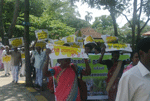Sri Lanka: Tea workers demand land, angry over plan to lease it to businesses
Published on Wed, 2012-10-17 11:57
More than 300 homeless Sri Lankan tea estate workers marched to demand land and housing rights in the city of Kandy on Sunday 14th. They have been angered by a clause in the national budget which proposes leasing unused plantation land to businesses. “Land rights are a dream for us,” said one of the marchers, 62-year-old Karuppaiya Nadaraja. “We have been living for 185 years without land of our own but we bring good income for the country with the world’s best black tea.” He and his wife, who is also a tea harvester, earn US$110 a month to support a family of six. “I have sacrificed the best years of my life bringing dollars to this country,” he said. Like his co-workers, Nadaraja is a direct descendant of the Tamil plantation workers who were brought to Sri Lanka from India by the British in the 19th century to provide cheap labor. Sri Lankan tea is one of the country’s biggest cash crops, but families working on tea estates are among the nation’s poorest. There are around 914,000 people in the plantation sector, the vast majority living on the estate where they work. Accommodation typically consists of ‘line rooms,’ one-room dwellings built in rows, close to the fields. An estimated 300,000 have been denied citizenship even though they were born in the country. “Politicians cheat and mislead them, companies focus only on income generation without considering their needs,” said Chinthaka Rajapaksha of the Movement for National Land and Agricultural Reform. “The fruits of their hard labor are pocketed by greedy plantation owners and politicians,” he said. “Their kids grow up malnourished and underweight.” He urged the government to re-think plans to offer vacant plots for lease to businesses and to grant them to the workers in the 2013 budget, which will be announced in November. President Mahinda Rajapaksa recently intimated that he sympathizes with the workers. “One of my major goals is to make the plantation community a home-owning society,” he wrote in a new book about the future for Sri Lanka. After yesterday’s march, protesters handed a petition to Sarath Ekanayake, Chief Minister of Central province. “I will talk with the president and find a solution for you soon,” he said. Source |


